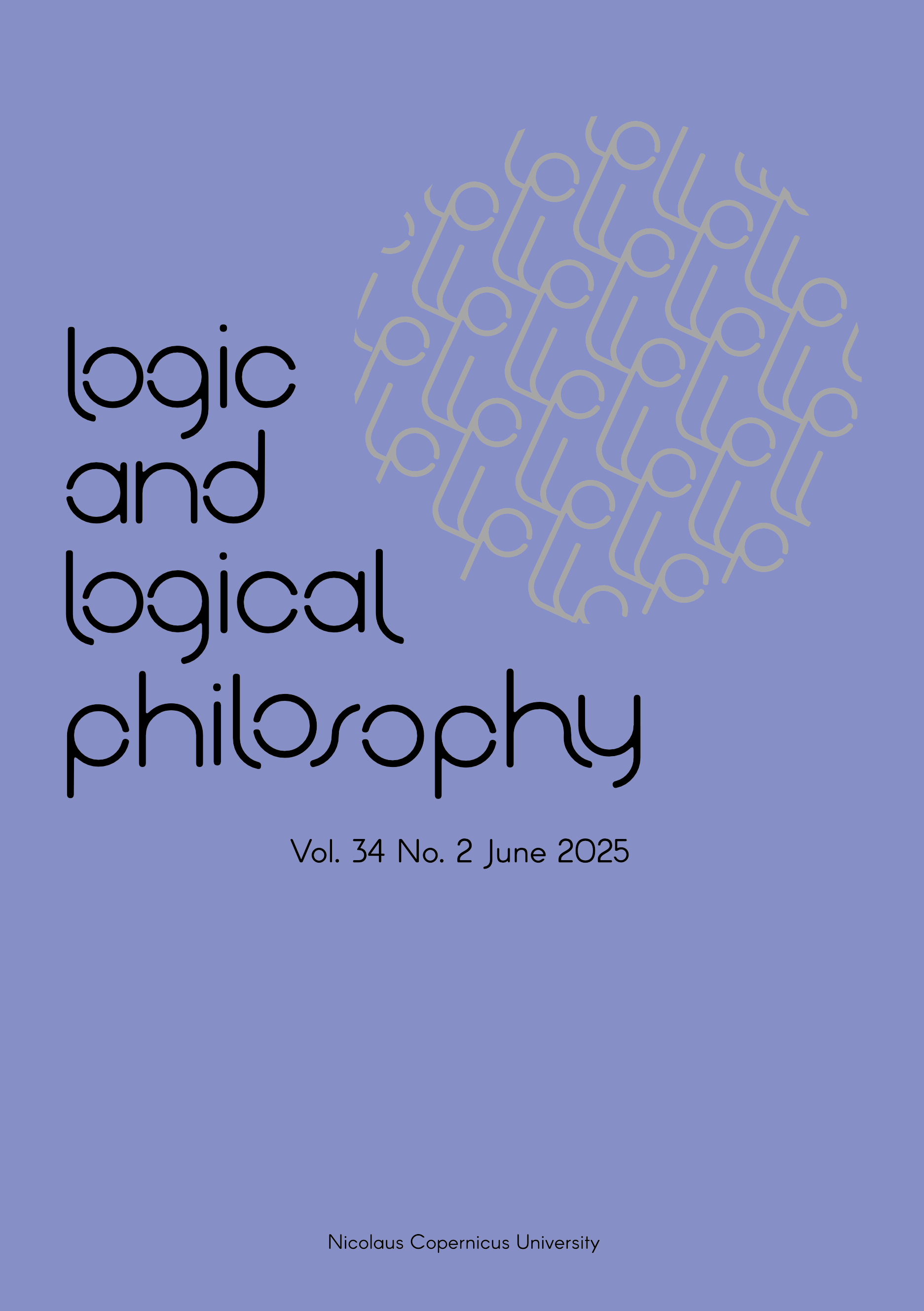Simplified Semantics for Further Relevant Logics II
Propositional Constants
DOI:
https://doi.org/10.12775/LLP.2024.022Keywords
relevant logics, simplified Routley-Meyer semantics, propositional constantsAbstract
It is shown how to model propositional constants within the simplified Routley-Meyer semantics. Various axioms and rules allowing the definition of modal operators, implicative negations, enthymematical conditionals, and propositions expressing various infinite conjunctions and disjunctions are set forth and shown to correspond to specific frame conditions. Two propositional constants which are both often designated as “the Ackermann constant” are shown to capture two such “infinite” propositions: The conjunction of every logical law and the conjunction of every truth –what Anderson and Belnap called the “world” constant.
References
Ackermann, W., 1956, “Begründung einer strengen Implikation”, Journal of Symbolic Logic, 21(2): 113–128. DOI: http://dx.doi.org/10.2307/2268750
Anderson, A. R., and N. D. Belnap, 1959, “Modalities in Ackermann’s “rigorous implication””, Journal of Symbolic Logic, 24(2): 107–111. DOI: http://dx.doi.org/10.2307/2964754
Anderson, A. R., and N. D. Belnap, 1975, Entailment: The Logic of Relevance and Necessity, volume 1, Princeton University Press, Princeton.
Belnap, N. D., and J. M. Dunn, 1981, “Entailment and the disjunctive syllogism”, pages 337–366 in G. Fløistad and G. H. von Wright (eds.), Contemporary philosophy: A new survey, volume 1, Springer Netherlands, Dordrecht. DOI: http://dx.doi.org/10.1007/978-94-009-8356-4_13
Berto, F., 2015, “A modality called ‘negation’ ”, Mind, 124(495): 761–793. DOI: http://dx.doi.org/10.1093/mind/fzv026
Berto, F., and G. Restall, 2019, “Negation on the Australian plan”, Journal of Philosophical Logic. DOI: http://dx.doi.org/10.1007/S10992-019-09510-2
Church, A., 1951, “The weak theory of implication”, pages 22–37 in A. Menne, A. Wilhelmy, and H. Angsil (eds.), Kontroliertes Denken: Untersuchungen zum Logikkalkül und zur Logik der Einzelwissenschaften, Kommissions-Verlag Karl Alber, Munich.
Meyer, R. K., 1966, “Topics in modal and many-valued logic”, PhD thesis, University of Pittsburgh. https://www.proquest.com/dissertations-theses/topics-modal-many-valued-logic/docview/302210710/se-2
Meyer, R. K., 1970, “E and S4”, Notre Dame J. Formal Logic, 11(2): 181–199. DOI: http://dx.doi.org/10.1305/ndjfl/1093893935
Meyer, R. K., and J. M. Dunn, 1969, “E, R and γ”, Journal of Symbolic Logic, 34: 460–474. DOI: http://dx.doi.org/10.2307/2270909
Øgaard, T. F., 2020, “Boolean negation and non-conservativity I: Relevant modal logics”, Logic Journal of the IGPL. DOI: http://dx.doi.org/10.1093/jigpal/jzaa019
Øgaard, T. F., 2021a, “Non-Boolean classical relevant logics I”, Synthese, 198: 6993–7024. DOI: http://dx.doi.org/10.1007/s11229-019-02507-z
Øgaard, T. F., 2021b, Non-Boolean classical relevant logics II: Classicality through truth-constants”, Synthese, 199: 6169–6201. DOI: http://dx.doi.org/10.1007/s11229-021-03065-z
Øgaard, T. F., 2024, “Simplified semantics for further relevant logics II: Propositional Constants”, Logic and Logical Philosophy. DOI: http://dx.doi.org/10.12775/LLP.2024.021
Priest, G., 2006, In Contradiction, Oxford University Press, Oxford, 2nd edition. DOI: http://dx.doi.org/10.1093/acprof:oso/9780199263301.001.0001
Priest, G., and R. Sylvan, 1992, “Simplified semantics for basic relevant logic”, Journal of Philosophical Logic, 21(2): 217–232. DOI: http://dx.doi.org/10.1007/BF00248640
Restall, G., “Simplified semantics for relevant logics (and some of their rivals)”, 1993, Journal of Philosophical Logic, 22(5): http://dx.doi.org/481–511. DOI: 10.1007/BF01349561
Restall, G., “On logics without contraction”, PhD thesis, The University of Queensland, 1994. https://consequently.org/writing/onlogics/
Restall, G., 2000, An Introduction to Substructural Logics, Routledge, London. DOI: http://dx.doi.org/10.4324/9780203016244
Routley, R., 1980, Exploring Meinong’s Jungle and Beyond, Departmental Monograph, Philosophy Department, RSSS, Australian National University, vol. 3. Canberra: RSSS, Australian National University, Canberra. https://hdl.handle.net/11375/14805
Routley, R., R. K. Meyer, V. Plumwood, and R. T. Brady, 1982, Relevant Logics and Their Rivals, volume 1, Ridgeview Publishing Company, Atascadero, California.
Slaney, J. K., 1989, “RWX is not Curry-paraconsistent”, pages 472–480 in G. Priest, R. Sylvan, and J. Norman (eds.), Paraconsistent Logic: Essays on the Inconsistent, Philosophia Verlag.
Standefer, Sh., n.d., Relevant Logics: Implication, Modality, Quantification, Cambridge University Press.
Weber, Z., 2010, “Transfinite numbers in paraconsistent set theory”, The Review of Symbolic Logic, 3(1): 71–92. DOI: http://dx.doi.org/10.1017/S1755020309990281
Downloads
Published
How to Cite
Issue
Section
License
Copyright (c) 2024 Tore Fjetland Øgaard

This work is licensed under a Creative Commons Attribution-NoDerivatives 4.0 International License.
Stats
Number of views and downloads: 1335
Number of citations: 0







